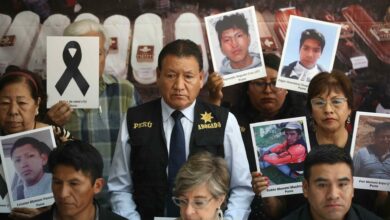Resignations, uncertainty in Sri Lanka after massive protests

(Update 1: Adds ministers’ resignations)
Colombo, Jul 10 (EFE).- Several Sri Lankan ministers stepped down on Sunday after president Gotabaya Rajapaksa and prime minister Ranil Wickremesinghe resigned in the wake of massive anti-government protests triggered by the severe economic crisis on the island.
Although Rajapaksa is set to tender his on Wednesday, both leaders officially remain at the helm of the island nation amid widespread uncertainty and political tension.
The investment promotion minister, Dhammika Perera, was one of those who resigned on Sunday, a day after thousands of people took to the streets of Colombo and occupied the presidential residences.
“Sri Lanka should expediate (sic) to identify and implement a solution that will achieve economic stability and address the needs of the people of our country,” he said in his resignation letter.
Transport Minister, Bandula Gunawardene, also formally quit the role he assumed nearly 16 days ago.
Ministers of tourism, Harin Fernanda, and foreign employment, Manusha Nanayakkara, also announced their willingness to resign.
They both had switched from the opposition to the Rajapaksa government formed in May after the previous cabinet was toppled by the protests, which began in March.
The departures are more of a political gesture, as the prime minister’s resignation means the cabinet would be dissolved once it is official, according to the Sri Lankan constitution, political analyst Aruna Kulatunga told Efe.
Meanwhile in the capital, calm reigned on Sunday, as Colombo’s streets were deserted and its shops closed for the day.
Rajapaksa, who has come under fire in recent months for his handling of the economic crisis in the island country, announced Saturday night that he would resign on Wednesday, the speaker of the country’s parliament, Mahinda Yapa Abeywardena said.
Hours earlier, Wickremesinghe also tendered his resignation and called for the formation of a national unity government.
Images on television and social media showed protesters enjoying the amenities at the lavish presidential mansion, including the swimming pool and well-equipped gym.
Protesters also set fire to the prime minister’s private residence in Colombo.
On Sunday morning, locals could be seen strolling through the presidential home, with some having spent the night there.
“I felt happy when we got the news that the president will resign. That is why we were here for months. Now we are here playing cards in his house,” 18-year-old Prabath Sandurwan told Efe.
The police used tear gas and charged against the protesters on Saturday in an attempt to contain them, injuring some journalists who were covering the events.
A source from the Colombo National Hospital, who requested anonymity, told Efe that 103 people injured during the protests had been admitted.
“The rumors that two people died at the protest are not true,” the source said.
Sri Lanka is facing one of the worst economic crises since its independence in 1948 due to a fall in foreign currency reserves and massive debt.





